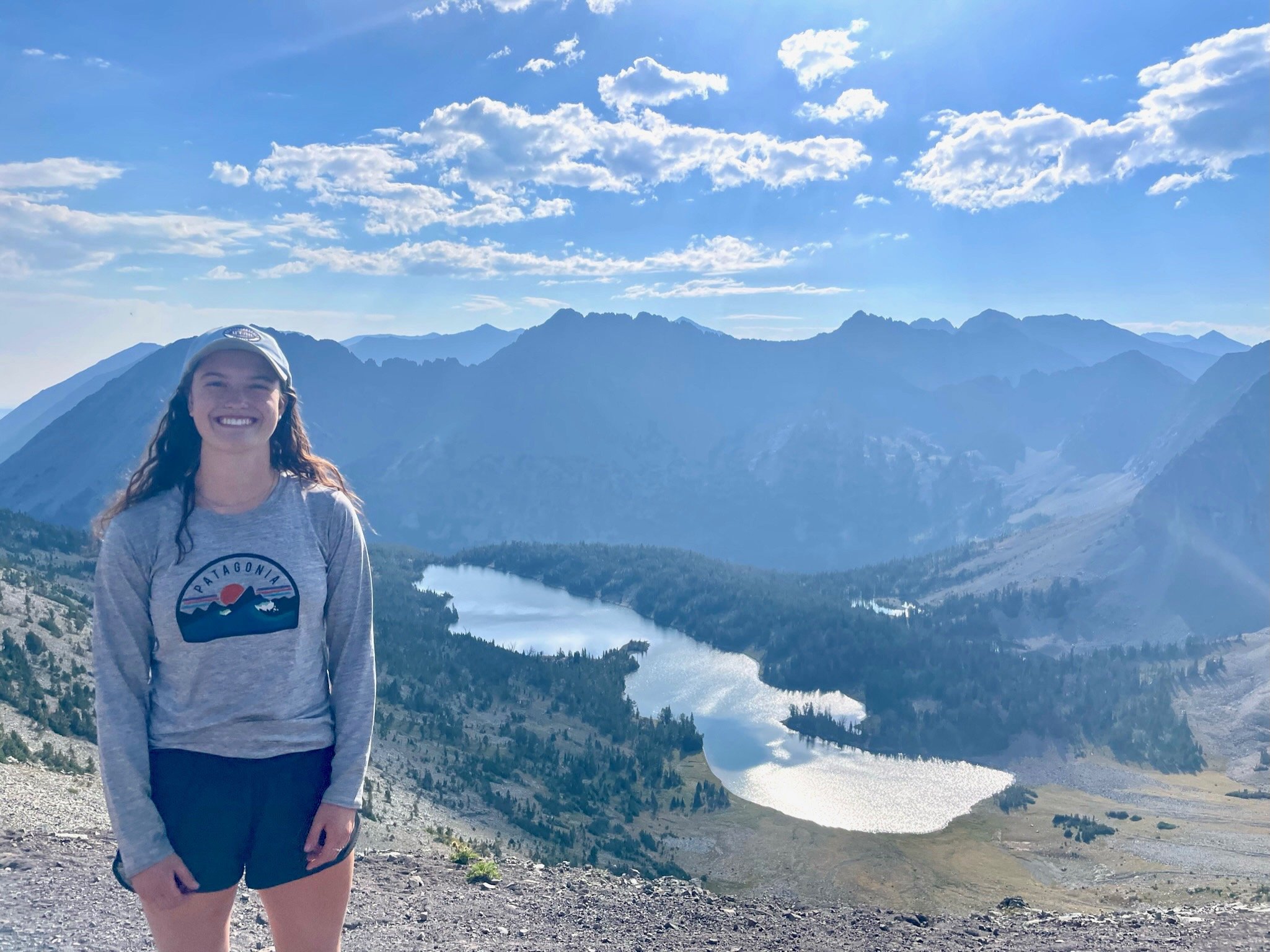Introducing Katherine Fazekas, PCEC's newest team member
Katherine joined PCEC for our annual backpacking trip into the Crazy Mountains.
We are excited to introduce Katherine Fazekas, who will be serving with Park County Environmental Council through the Montana Campus Compact (MTCC) VISTA Resilience Cohort program this year!
Katherine is a Massachusetts native and recent Holy Cross graduate with a background in chemistry and biochemistry. Her passion for environmental science and activism drew her to Americorps and PCEC. In her free time, she enjoys being active outdoors through skiing, ice hockey, hiking, and fishing.
Katherine started in August, and she is already enjoying engaging with the Livingston and Park County communities.
Her goal for the year is to create a campaign culminating in a Community Resilience Plan for Park County, through seeking input from community members as well as local nonprofits, businesses, and government. This plan will help Park County remain strong as we face a new climate reality: from rain-on-snow driven flood events like we saw this year, to prolonged drought, which we’ve been facing already for the last couple years, to potential wildfires, which we have already witnessed locally and have face with more likelihood of fire predicted for our area in the future.
A Climate Resilience Plan will consist of preparing infrastructure for climate hazards; it will also be interdisciplinary, incorporating input from groups working on the specific needs of Livingston and Park County such as housing, mental health, and transportation. The plan will actively focus on supporting low-income populations, as they are most impacted by adverse climate events.
Resilience means building community and individual relationships, using physical resources, and developing strategic planning initiatives to remain sustainable, equitable, and strong.
Katherine’s efforts will be in partnership with four other MTCC Americorps VISTAs working in Montana communities as a statewide resilience cohort to bolster the capacity of the state to adapt and grow in the face of adversity.
The goal of the MTCC VISTA Resilience Cohort is to improve outcomes for communities by “working with community stakeholders, municipal governments, Sovereign Tribes, and local agencies to promote community conversations, educational outreach, and medium to long-term planning initiatives which address climate mitigation and adaptation strategies”.
Katherine will also serve as our first Hays Fellow. PCEC has been working with John Heidke to create the Hays Fellowship, in memory of John’s late wife, Barbara Hays. The Hays Fellow will build and expand our Conservation Leadership program.
Conservation Leadership aims to create opportunities for discussion and dialog. Nurturing that aspect builds trust, even when there is disagreement. That foundation will strengthen the community as a whole, or at least provide the potential to bring people together. All of our most pressing issues need that component: from rapid population growth to commercial and residential development pressures, to ecological changes occurring because of global warming.
Katherine’s work will strengthen the work PCEC is currently engaged in to increase resilience in our area, such as drought mitigation, weed monitoring, and housing initiatives that benefit our land, water, wildlife, and community. This includes:
Housing: PCEC considers housing the most critical issue facing our community. We have participated in the Park County Housing Coalition over the past three-plus years. Four PCEC team members participated in the Park County Housing Working Group and helped create the Park County Housing Action Plan. We've helped the community update both the city and county growth policies, and we consider housing in all of our community planning work.
Housing has become a core tenet of PCEC in recent years because we believe that taking care of people in our community is central to our mission and values. We believe that people need safe and affordable housing in order for our community to thrive. We believe that learning to grow together, creating thoughtful development that consolidates growth in our urban footprints is good for our human and our non-human community members. And ultimately, we don’t think we can do long-term conservation in this community if we don’t work together on housing. While some people might think that “no growth” is the best approach, we don’t think it’s realistic or equitable — especially in the face of a changing climate and growing floods, wildfires and other natural disasters.
Drought: PCEC has been working to build resiliency within the community to adapt and respond to the persistent threat of drought and climate change through active membership in the Upper Yellowstone Watershed Groups's Drought Focus Group. The Focus Group is looking at local watershed specific issues as they relate to the larger drought conditions in the west; PCEC is also a stakeholder representative for Department of Natural Resources and Conservation’s Montana Drought Management Plan update.
Ecological Monitoring: PCEC has been working to increase resiliency in our land through the Noxious Weed Monitoring Program: a new invasive and noxious weed treatment monitoring program that analyzes the efficacy of existing treatment methods in order to determine best weed management practices. This program is important in the face of changing climate and increasingly sensitive native plant communities.
Data collected will be valuable for wildlife habitat conservation, sustainable agriculture, climate change adaptation, all the while working on an issue that producers and conservationists care deeply about. This project is a unique opportunity to not only strengthen climate resilience in Park County but to build diverse relationships to strengthen community resilience.
Livingston Loves Trees: This program grew out of a collaborative effort with the City Tree Board and a group of local volunteers. Livingston has historically valued trees and is a “Tree City'.' However, the majority of community trees are ash, putting our community forest at risk for damage by invasive species such as the emerald ash borer. The most recent tree survey, in 2014, identified hundreds of vacant spaces in need of trees along our boulevards and in our parks.
LLT has a goal of planting 1,000 trees in Livingston over the next 10 years. In 2022, with the help of AmeriCorps members, LLT planted a diverse mix of 65 hardy, young trees through an Adopt-a-Tree program. For 2023, LLT is aiming to plant 100 trees on boulevards, at schools, and potentially in other public spaces.
Green Initiative: For the past five years, PCEC has supported the Green Initiative, an extracurricular club at Park High School. The Green Initiative was formed by a group of students who wanted to create a recycling program at the school. They have since raised money to install solar panels on the school roof, organized Earth Day events and are currently exploring the purchase of an electric school bus for the district.
Many Green Initiative members have also applied for and worked as interns for PCEC as part of our Conservation Leadership program, learning hands-on community organizing skills, presenting research on alternative transportation concepts to local leaders and helping us run the zero waste station at the Livingston Farmers Market.
Trails and Active Transportation: PCEC advocates for and supports county wide trail planning, design, stewardship, fundraising and implementation of trails and non-motorized infrastructure. This will be achieved by working with local partners such as the Livingston Bike Club, Green Initiative, City and County Parks and Trails Boards, Public Works, local land owners, Rails-to-Trails Conservancy and more.
In 2022, we aim to support our partners in developing, building and stewarding trail projects; help implement the newly City Trails and AT Plan priorities and support the County updating their trails and AT planning documents.
We’re excited for Katherine’s work. Park County is going to face a lot of challenges in the coming decades, and we need to start preparing for them today.

